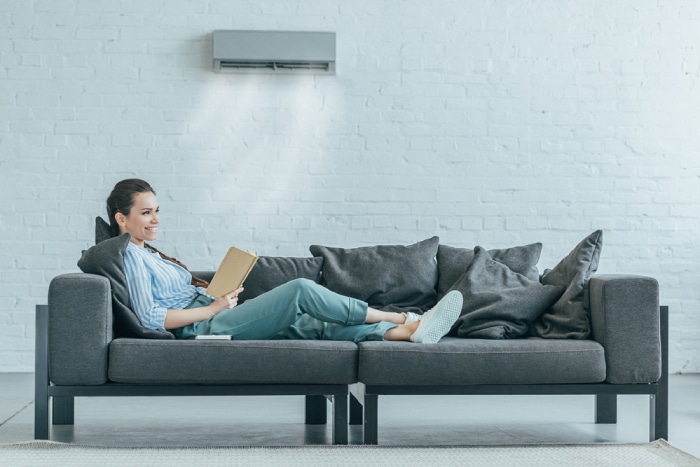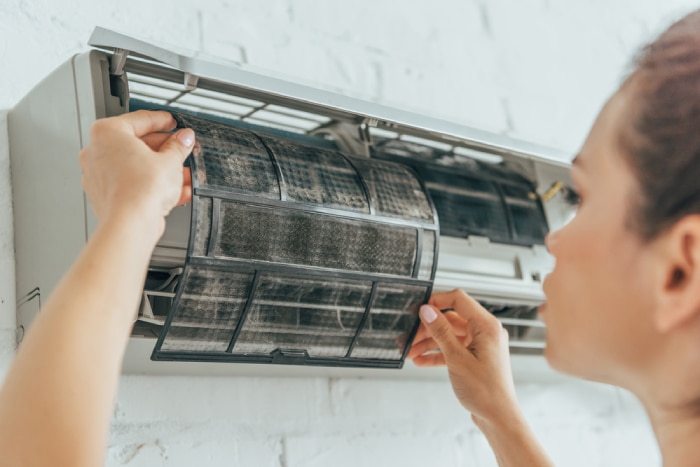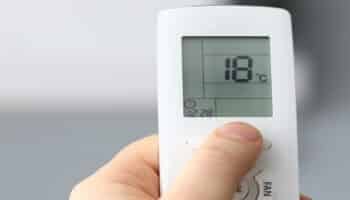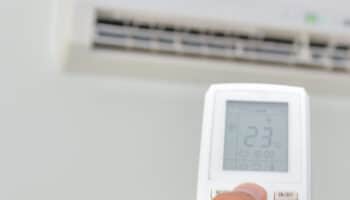Without air conditioning in our homes and businesses, our days would be miserable. However, these essential appliances do more than keep us cool. They filter and dehumidify the air, which keeps our houses and workplaces cleaner and more comfortable.

Like any home system, though, an air conditioner can fail to work correctly. Sometimes it will give you visual and audible cues, and sometimes it will not. When hearing water sounds from your air conditioner, there are certain things the sounds might be telling you. That is if you understand the language of a gurgling AC unit.
Before calling a professional, read on to understand why you are hearing water sounds from your air conditioner and what you can do about it.
How Your Air Conditioner Works
Today’s air conditioning systems have come a long way since their inception. However, all air conditioning systems have several things in common. They take the hot air from your home, remove the heat from it, and cool the air by blowing it over finned plates cooled by a refrigerant. An air intake inside your home draws air from your home and blows it across the fins of the evaporator.
The evaporator then exchanges the thermal energy of the warm air. This action produces cool air, which is returned to your home. When this exchange occurs, the refrigerant becomes a gas. Then, it returns to the outside unit to exchange its heat for becoming a liquid again.
The outside air conditioning unit is the compressor, and its role is to take the heated Freon from your home and return it to a liquid state by cooling it. Once a liquid, again, the Freon is forced into the evaporator and the process begins again. This process will continue until your home reaches the temperature you selected with the AC’s thermostat.
The above process can cool our home quickly and does so mostly in silence. However, it also produces water, which you must do somewhere besides inside your home.
Reasons your Air Conditioner may be Making Water Sounds
When you are turning hot air into cool air, water is a byproduct due to condensation. This is a natural occurrence produced by heat transfer between the warm air and the cold evaporator plate. For example, the inside evaporator of an AC unit is placed above a drip pan. Here the water it produces will either evaporate or be drained outside or into your plumbing.
Hearing water sounds may mean a clogged drip pan
Some air conditioners are designed to be self-evaporative, while others are not. The difference is the way the unit handles the water produced from turning warm to cold air. For example, a self-evaporative unit is designed so that the condensate drips onto a warmed drip pan that causes the water to evaporate. Other AC units have the condensate drip into the pan, and then it is drained away, usually outside of your home.
On days with extreme humidity, your air conditioner may produce more condensation than on drier days. If that is the case, you may hear the additional water drip from the evaporator into the drip tray. However, that dripping sound may indicate another problem.
Clearing a clogged Air Conditioner drain
If the drain hose of your AC’s drip pan becomes clogged, it could make gurgling or dripping noises. If unattended, the leaking could cause damage to the unit and anything around it that might get wet.
Clearing the drain pan of an air conditioner is not beyond the skill of most homeowners. If that is, the AC is not so hard to access that it requires a contortionist to access it.
Some AC units are put in locations that make one scratch their head when looking at service. If you question your ability to maintain your air conditioner, calling a professional would be the best thing to do.
How to clean your Air Conditioners drip pan
For those who are more adventuresome, here is how to clean your air conditioner’s drip pan.
- Turn the air conditioner off with the thermostat and the breaker box. Water and electricity do not mix, so be safe and cut the power. Now that the power is off, locate your AC unit’s evaporator, usually in a closet, garage, or other out-of-the-way places.+
- When you find it, locate the drain hose that runs from the drip pan to the outside. Check where the hose exits the house to be sure it is not clogged from that end. Water in the drip pan means it is not draining. If this is the case, you can try using a wet/dry vacuum from outside to see if that clears the clog.
- Check your air filter. Is it dirty? A clogged air filter can prevent your evaporator from cooling off between cycles. This can cause your system to produce more condensation than usual.
- If the drain line is not clogged, but your air conditioner still has an overflowing drain pan, you may have a faulty condensate pump. This pump is used to remove the condensate from your drip pan and pump it outside. If it is not working correctly, it can cause your drip pan to overflow. Replacing a faulty condensate pump is usually more than most do it yourselfers can tackle. If yours is not working, you will need to call a professional to troubleshoot your system.
An Air Conditioner that Gurgles or Bubbles could Need Gas
You should never be able to hear the refrigerant of your air conditioner circulate through the system. A bubbling or gurgling sound could indicate a problem with the pressure of the gas in the system.
An air conditioner that gurgles or bubbles could be due to a leak in the refrigerant system or because it has been overcharge. An overcharged compressor means that the system has too much refrigerant in its lines, creating a pressure imbalance. The pressure imbalance can cause a gurgling or bubbling noise. Unfortunately, this fix is beyond the ability of most do it yourselfers, and you will need to call a professional to look at your air conditioner.
If you think that you might have a refrigerant leak, call a professional right away. Air conditioner refrigerant is toxic and can pose a danger to you, your family, and pets.
Keeping your Air Conditioner Maintained
As you see, hearing water sounds from your air conditioner may be a simple fix. Or you may need the service of a professional technician to get you cooled down. Either way, a significant factor in an air conditioner running efficiently is annual maintenance. Therefore, it would be best to give your air conditioner a good once over annually, in the spring or fall. In addition, tips for maintaining your air conditioner can help you prevent your air conditioner problems by finding them early.

- Change the filter of your AC once a month because it is the most critical maintenance step you can take. A dirty filter will keep your AC from running optimally, which wastes energy and can cause premature breakdowns of your air conditioner.
- Keep your thermostat adjusted to the rhythm of the house. Electronic, programmable thermostats can help you keep your home at the perfect temperature while controlling your energy usage.
- Keep the coils of the outside unit of your air conditioner clean. The outdoor unit is what cools the refrigerant after it cools your home. Dirty coils around the compressor can cause it to get hotter than it should. Overheating can shorten the life of your air conditioning system. By keeping the coils of your AC clean, you can lengthen its useable life.
- Keep shrubbery and any other objects away from the outside of your air conditioner’s compressor unit. Clear any obstructions so that air can flow clearly around the unit. Also, leaves or other debris can clog it up and cause overheating.
- Inspect the ductwork because that is where the most energy of an air conditioner is wasted. You need to visually inspect your air conditioner once a year and seal any leaky ductwork. Leaky air conditioner ductwork can make your air conditioner work harder, which increases your power bill.
Suppose your air conditioner is performing as it should, and you still have a problem with humidity. For areas with high humidity, a humidifier in the summer months can help remove excess moisture. This simple measure can aid your air conditioner and keep it from working so hard to keep your home cool.
If you want to get any replacement part – or see how much one would cost – click to enter your model number in the search bar below. Our partners at AppliancePartsPros stock almost every part with free guides on how to install them.








